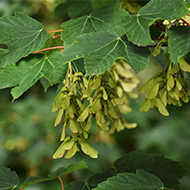
Horse owners urged to take practical steps to avoid atypical myopathy.
Horse owners are being urged to keep their horses safe from the risk of sycamore trees.
The reminder from the British Equine Veterinary Association (BEVA) comes at the start of sycamore seed season, which poses a risk to horses due to atypical myopathy, or sycamore seed poisoning.
BEVA veterinary projects officer Lucy Grieve stated: “With leaves still on trees now is the time to identify sycamores in the vicinity of your horse’s fields and predict the future risk. Once the leaves start to turn and then drop it will be much more difficult to spot sycamores.”
Sycamore seeds are produced in abundance during the autumn, and spread considerable distances during high winds.
The BEVA says that while grazing horses should ideally by kept away from sycamore trees, horse owners with no other option should provide supplementary forage in the field 'to help keep them occupied' and 'prevent them from ingesting seeds.'
They add: 'It is imperative to seek veterinary attention immediately if horses that have access to sycamore seeds show any signs of illness.'
Sycamore seeds produce a poisonous toxin called Hypoglycin A, which can remain present in high concentrations in seedlings. When a horse eats these seeds, either by accident or because they lack alternative forage, they can develop atypical myopathy – a severe and often fatal condition that leads to muscle damage.
Another hazard of the autumn season for horses is acorn poisoning. However, these are more manageable because they fall under the trees and are too heavy to spread very far.
The BEVA advises that horse owners take the following steps to reduce the risk of sycamore seed or acorn poisoning:
· identify trees both around grazed fields as well as those in close proximity.
· collect seeds or exclude horses from affected areas using electric fencing or stabling.
· feed supplementary hay to try and prevent horses from excessive foraging for short blades of grass and inadvertent ingestion of seeds. (Ensure that hay does not become contaminated by seeds).
· don’t rashly fell trees when laden with seeds as this can cause a sudden and massive contamination of the pasture.
· monitor horses carefully even after they have been moved from affected pasture as disease can occur up to four days after exposure.
Image (C) Shutterstock.



 The Veterinary Medicines Directorate (VMD) is inviting applications from veterinary students to attend a one-week extramural studies (EMS) placement in July 2026.
The Veterinary Medicines Directorate (VMD) is inviting applications from veterinary students to attend a one-week extramural studies (EMS) placement in July 2026.